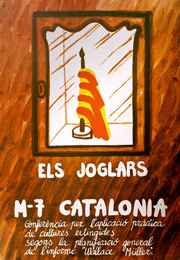


Premiere the 27th september 1978 at Teatre Municipal de Perpinyà.
Shown until the 8th may 1981.
Those of us in theatre always end up discovering a more imaginative reality which by far exceeds any fable we could have invented, however delirious it may have seemed.
It could be that M-7 Catalonia doesn’t completely belong to the world of fiction, as present conditions show favourable signs of reality leading to the same situation.
Therefore, Dr. Noguera Grau (XI 7781 B) and Dr. Plana River (BL 5432) already have a good deal of the elements needed to bring their investigation to an end and display their theories in the conference-protest on sector 7 of the Mediterranean, which, with the exception of 4 elders, is nearly extinct.
The perfect, programmed and prophylactic society needs our things (those which had belonged to us) so that they can ‘play’ in their ‘areas of social entertainment’ reproducing those very impractical and irrational ways of life.
There’s no need to worry, they haven’t lost their heads. This is simply a new therapy for social equilibrium. Some centuries earlier Marie Antoinette, the queen of France, set off the experience by constructing a mini-village for herself which began in the gardens of Verseilles, her aim being to play at ‘peasants’ with her courtesans. According to Dr. Plana River’s theory this could be a ‘naturist psychiatric self-treatment’ this time, however, with the difference that the experiment doesn’t wish to be so class conscious, clearly directed at all citizens without discrimination, as specified in the Wallace Müller report and of course with the strict condition that the practice would only be limited to the sectors of ‘Recreation and Social Entertainment’.
Doctor Noguera Grau (XI 7781 B): Anna Barderi
Doctor Plana River (BL 5432): Carme Periano
Amparito: Pitus Fernández
Cisco: Rafael Orri
Jaume: Ramon Teixidor
Martí: Antoni Vicent Valero
Director: Albert BOADELLA
Scenography: Fabià PUIGSERVER
Collaboration: Lluís RACIONERO
Technician: Miquel ARISA
Technician: Dino IBÁÑEZ

Diario de Barcelona. P. Espinosa Bravo
En conjunto M 7 Catalònia resulta un espectáculo divertido y profundo,
brillante y tremendamente reflexivo en donde se demuestra de nuevo la gran
capacidad de creación teatral de Albert Boadella.
Egin
Estamos ante un hermosísimo espectáculo ambicioso y con hallazgos soberanos.
Un hecho teatral de gran altura. Un trabajo que hace pensar al espectador y al
crítico cosa no demasiado frecuente en nuestros escenarios. Este es el teatro que
vale la pena.
Gaceta Ilustrada. Fernando Lázaro Carreter
M 7 Catalònia... Una cultura en el cuadrante nordeste de España que aspira
enérgicamente a perdurar. Pero, contemplando esa jocosa mostración
caricaturesca de sus rasgos, yo me preguntaba si había que cambiar mucho,
aparte del idioma, la barretina y la sardana –por supuesto, no la paella- para
que fuera idénticamente válida en los restantes cuadrantes de la península y sus
islas. No sé por qué, estuve jugando a cambiar aquellos catalanes por
aragoneses, extremeños o castellanos, y los resultados me salían
turbadoramente análogos.
Fotogramas. José Antonio Gabriel y Galán
M 7 Catalònia resulta apasionante por lo que tiene de magistral realización
teatral. Boadella ha hecho una obra de arte escénica. Todo en ella, cada detalle,
cada gesto, cada ruido, es un goce teatral; la imaginación escénica desarrollada
es de las que hace época. El mimo básico ha llegado a la perfección. Si al mimo
tradicional sólo le faltaba hablar, aquí habla sin perder su íntima condición de
mimo.
realmente es difícil describir la maravilla técnica de este espectáculo que es, no
hay que olvidarlo, ante todo, divertidísimo.